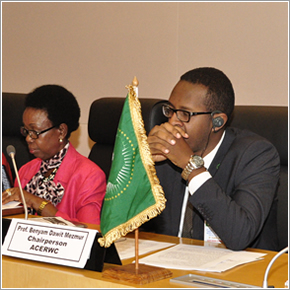The African Committee of Experts on the Rights of the Child (African Children’s Rights Committee) has made public its second finding on a communication (case) submitted to it. This case deals with the conditions of some 100,000 children (called talibés) who, while attending Qur’anic schools in Senegal, are required to beg on the streets of Dakar and other urban centres, to secure their own survival. The case was submitted as far back as 2012 by the Centre for Human Rights, University of Pretoria, and the NGO la Rencontre Africaine pour la Defense des Droits de l’Homme (RADDHO), Senegal (Centre for Human Rights and la Rencontre Africaine pour la Defense des Droits de l’Homme (on behalf of Senegales Talibés) v Senegal, ACERWC, Comm/001/2012, 15 April 2014.)
![]() Download this press statement
Download this press statement![]() Download the decision on the communication
Download the decision on the communication
The African Children’s Rights Committee is an African Union (AU) organ, mandated to monitor state compliance with one of the AU’s major human rights treaties, the African Charter on the Rights and Welfare of the Child (African Children’s Charter). To date, 47 of the 54 AU states have accepted this treaty as binding. Senegal is one of these states.
In its finding, the Committee holds Senegal responsible for the activities of these schools, even if they are non-state entities. The Committee holds that the state has to ensure that the best interests of children are respected. It is not enough for Senegal to argue that it has adopted laws making ‘forcing a child to beg’ a criminal offence. Because Senegal has done little in practice to effectively implement these laws, the Committee finds that it violated numerous rights in the African Children’s Charter including the right to survival and development; education; health; the prohibition of child labour, and the prohibition of using children in the form of begging.
The African Children’s Rights Committee consists of 11 independent African experts, who serve part-time and meet twice a year at its seat in Addis Ababa, Ethiopia. Individuals or NGOs may approach the Committee for recourse after they have exhausted domestic remedies. The first communication decided by the Committee was against Kenya, and relates to the difficulties experienced by children of Nubian descent in obtaining birth registration in that country. This case is Institute for Human Rights and Development in Africa and the Open Society Initiative (on behalf of the children of Nubian descent in Kenya) v Kenya, ACERWC, Comm/002/2009, 22 March 2011.
In addition to considering such communications, the Committee also examines state reports. All state parties to the African Children’s Charter have to submit regular reports about their implementation of the treaty.
The Director of the Centre, Frans Viljoen, thanked RADDHO for their productive collaboration, and praised the Centre staff, including students on the Master’s programme in Human Rights and Democratisation in Africa, who worked on the preparation and presentation of the case. He added: “This, only the second finding of the Committee, is significant for a number of reasons: It highlights that states are not only responsible for providing formal legal protection, but also to ensure the effective enforcement of laws in order to achieve tangible results. The case provides a rare example of a government not denying responsibility, but adopting a collaborative approach towards finding long-lasting solutions”. However, Viljoen expressed regret that the decision which was adopted on 15 April 2014, was only made public on 26 May 2015. The outcome of another case, submitted by the Centre, is still being awaited.
![]()
For more information, please contact:
Prof Frans Viljoen
Director: Centre for Human Rights
University of Pretoria
Tel: (012) 420 3228
Email: frans.viljoen@up.ac.za
www.chr.up.ac.za


